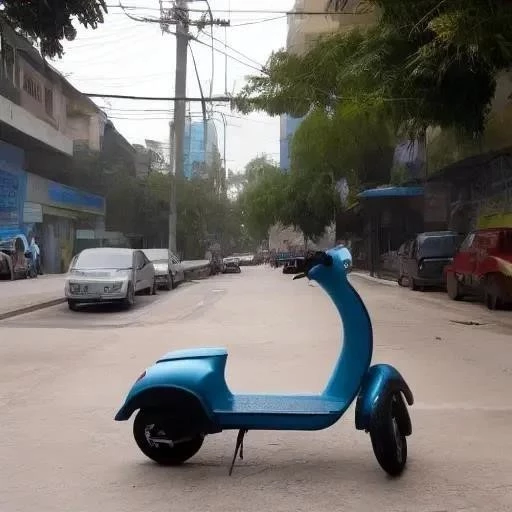The Indian electric vehicle market is heating up, and all eyes are on major players like Yamaha to see how they will contribute to this revolution․ Rumors are swirling that Yamaha may launch electric bikes and scooters in India, potentially disrupting the current landscape dominated by local manufacturers․ This move could introduce a new level of quality and performance to the electric two-wheeler segment․ If Yamaha may launch electric bikes and scooters in India, it would definitely attract a large segment of the population as they look for electric vehicles, with the quality that the brand Yamaha is known for․
A Yamaha entry would undoubtedly shake things up․ The company’s reputation for reliability and innovation could draw consumers away from existing brands․ Their global experience in electric vehicle technology could also lead to more advanced and feature-rich electric bikes and scooters hitting the Indian market․
- Increased Competition: More choices for consumers, potentially driving down prices․
- Technological Advancement: Yamaha could introduce new battery technologies, motor designs, or software features․
- Infrastructure Development: A major player like Yamaha entering the market could incentivize the development of more charging infrastructure․
While details remain scarce, speculation is rife about the models Yamaha might introduce․ Will they focus on high-performance electric bikes aimed at enthusiasts, or more affordable electric scooters designed for urban commuting? Or perhaps a combination of both? The choice will depend on their market research and understanding of Indian consumer preferences․ We can only guess until Yamaha releases official information, but the anticipation is building․
- Battery Range: A crucial factor for Indian consumers, especially those who commute long distances․
- Charging Time: Convenience is key, so fast charging will be a major selling point․
- Motor Power: Performance is important, but so is efficiency․ Finding the right balance is critical․
Entering the Indian EV market won’t be without its challenges․ Establishing a robust supply chain, navigating regulatory hurdles, and competing with established local players will all require careful planning and execution; However, the potential rewards are enormous, given the rapidly growing demand for electric vehicles in India․
Yamaha may launch electric bikes and scooters in India, and that alone is enough to make the current market leaders to start innovating and creating better and more affordable bikes for the Indian consumers․
The Indian electric vehicle market is heating up, and all eyes are on major players like Yamaha to see how they will contribute to this revolution․ Rumors are swirling that Yamaha may launch electric bikes and scooters in India, potentially disrupting the current landscape dominated by local manufacturers․ This move could introduce a new level of quality and performance to the electric two-wheeler segment․ If Yamaha may launch electric bikes and scooters in India, it would definitely attract a large segment of the population as they look for electric vehicles, with the quality that the brand Yamaha is known for․
The Potential Impact on the Indian EV Market
A Yamaha entry would undoubtedly shake things up․ The company’s reputation for reliability and innovation could draw consumers away from existing brands․ Their global experience in electric vehicle technology could also lead to more advanced and feature-rich electric bikes and scooters hitting the Indian market․
- Increased Competition: More choices for consumers, potentially driving down prices․
- Technological Advancement: Yamaha could introduce new battery technologies, motor designs, or software features․
- Infrastructure Development: A major player like Yamaha entering the market could incentivize the development of more charging infrastructure․
Possible Models and Specifications
While details remain scarce, speculation is rife about the models Yamaha might introduce․ Will they focus on high-performance electric bikes aimed at enthusiasts, or more affordable electric scooters designed for urban commuting? Or perhaps a combination of both? The choice will depend on their market research and understanding of Indian consumer preferences․ We can only guess until Yamaha releases official information, but the anticipation is building․
Key Features to Watch For
- Battery Range: A crucial factor for Indian consumers, especially those who commute long distances․
- Charging Time: Convenience is key, so fast charging will be a major selling point․
- Motor Power: Performance is important, but so is efficiency․ Finding the right balance is critical․
Challenges and Opportunities
Entering the Indian EV market won’t be without its challenges․ Establishing a robust supply chain, navigating regulatory hurdles, and competing with established local players will all require careful planning and execution․ However, the potential rewards are enormous, given the rapidly growing demand for electric vehicles in India․
Yamaha may launch electric bikes and scooters in India, and that alone is enough to make the current market leaders to start innovating and creating better and more affordable bikes for the Indian consumers․
Strategic Considerations for Yamaha
The success of Yamaha’s potential foray into the Indian EV market hinges on several strategic considerations․ A nuanced understanding of the local ecosystem, encompassing consumer behavior, regulatory frameworks, and competitive dynamics, is paramount․ Furthermore, a well-defined market entry strategy, encompassing product positioning, pricing models, and distribution channels, is crucial for achieving sustainable market penetration․ The company must also consider the implications of government policies and incentives aimed at promoting electric vehicle adoption, and adapt its strategy accordingly․
One critical aspect to address is the establishment of a reliable and efficient after-sales service network․ This network should provide readily available maintenance, repairs, and spare parts to ensure customer satisfaction and build brand loyalty․ Moreover, Yamaha should invest in educating consumers about the benefits of electric vehicles and dispel any misconceptions that may hinder adoption․ This could involve conducting awareness campaigns, offering test rides, and providing comprehensive information about battery technology, charging infrastructure, and operating costs․
Potential Partnership Opportunities
To accelerate its entry into the Indian EV market, Yamaha could explore potential partnerships with local manufacturers, technology providers, or charging infrastructure companies․ Collaborating with established players can provide valuable insights into the local market, facilitate access to existing distribution networks, and expedite the development of charging infrastructure․ Such partnerships could also enable Yamaha to leverage local expertise and resources to reduce costs and enhance its competitiveness․
A strategic alliance with a battery manufacturer, for example, could secure a reliable supply of high-quality batteries at competitive prices․ Similarly, partnering with a charging infrastructure provider could ensure that Yamaha’s electric bikes and scooters have access to a widespread and accessible charging network․ These collaborations could prove instrumental in establishing a strong foothold in the Indian EV market and achieving long-term success․
The long-term prospects for electric two-wheelers in India are undeniably bright․ As environmental awareness grows and government support intensifies, the demand for electric vehicles is expected to surge in the coming years․ If Yamaha capitalizes on this opportunity by offering innovative, reliable, and affordable electric bikes and scooters, it could emerge as a major player in the Indian EV market․
Analyzing the Competitive Landscape
The Indian electric vehicle market, while nascent, is characterized by a diverse array of players, ranging from established domestic manufacturers to emerging startups․ A comprehensive analysis of this competitive landscape is imperative for Yamaha to formulate a differentiated market entry strategy․ This analysis should encompass an assessment of the strengths and weaknesses of key competitors, their product offerings, pricing strategies, and distribution networks․
Furthermore, it is crucial to identify the factors that drive consumer preferences in the Indian EV market․ These factors may include price sensitivity, range anxiety, charging infrastructure availability, and brand reputation․ Understanding these drivers will enable Yamaha to tailor its products and marketing efforts to resonate with the target audience and gain a competitive edge․
Benchmarking Against Global Best Practices
To ensure that its electric bikes and scooters meet the stringent quality standards expected by Indian consumers, Yamaha should benchmark its products against global best practices․ This involves studying the design, performance, and safety features of leading electric two-wheelers from around the world and incorporating relevant innovations into its own products․
Moreover, Yamaha should adopt a robust testing and validation process to ensure that its electric vehicles are capable of withstanding the harsh operating conditions prevalent in India․ This includes rigorous testing for durability, reliability, and performance under extreme temperatures, humidity, and road conditions․ By adhering to global best practices and conducting thorough testing, Yamaha can build consumer confidence in its electric vehicles and establish a reputation for quality and reliability․
Addressing Infrastructure Challenges
One of the primary challenges hindering the widespread adoption of electric vehicles in India is the limited availability of charging infrastructure․ To address this challenge, Yamaha could collaborate with charging infrastructure providers to expand the charging network in key urban areas and along major highways․ This collaboration could involve investing in the deployment of charging stations, providing incentives for private individuals to install charging points, and developing interoperable charging protocols․
Furthermore, Yamaha should explore innovative charging solutions that cater to the specific needs of Indian consumers․ This could include developing portable chargers, battery swapping stations, and wireless charging technologies․ By addressing the infrastructure challenges and providing convenient charging solutions, Yamaha can alleviate range anxiety and encourage more consumers to switch to electric vehicles․
Promoting Sustainable Mobility
Beyond the immediate business benefits, Yamaha’s entry into the Indian EV market presents an opportunity to promote sustainable mobility and contribute to a cleaner environment․ By offering electric bikes and scooters that are emission-free and energy-efficient, Yamaha can help reduce air pollution and greenhouse gas emissions in Indian cities․
Moreover, Yamaha can engage in public awareness campaigns to educate consumers about the environmental benefits of electric vehicles and encourage them to adopt sustainable transportation practices․ This could involve partnering with environmental organizations, participating in community events, and sponsoring educational programs․ By actively promoting sustainable mobility, Yamaha can enhance its brand image and contribute to a more sustainable future for India․


